The eco-friendly advantages of using a Restroom Trailer are notable, particularly for event organizers seeking sustainable sanitation solutions. Modern restroom trailers are designed specifically with environment-friendly features to reduce water and energy consumption. Many units are equipped with high-efficiency flush systems, reducing water usage compared to conventional portable toilets and public facilities. Additionally, the use of solar panels for lighting and water heating in some models contributes to reduced carbon footprints, minimizing reliance on grid electrical power. Furthermore, restroom trailers use eco-friendly cleaning agents and technologies that meet environmental standards, maintaining hygiene without the detrimental effects of harsh chemicals. This aspect is integral as it supports the health of ecosystems, particularly for outdoor events held in nature-rich areas like parks and recreational fields. Another advantage is the minimal waste production. Restroom trailers are built to collect and manage waste efficiently. The implementation of holding tanks segregates waste until it can be safely and responsibly disposed of or treated, avoiding contamination risks associated with soil and water resources. This efficient waste management highlights the ecological compliance of restroom trailers, promoting sustainability at events. Convenient designs and easy accessibility further enforce the eco-friendly message by facilitating efficient crowd flow and reducing idling time, which is often a source of unnecessary environmental stress during large gatherings. By providing comfortable and eco-conscious facilities, restroom trailers minimize the human impact on the environment while offering a premium experience to users. Restroom trailers serve as a testament to the growing commitment to sustainability in event management and open space utilization in Simpsonville. Their elegant fusion of comfort and ecological sensitivity makes them the preferred choice for organizers who prioritize green initiatives in their planning processes.
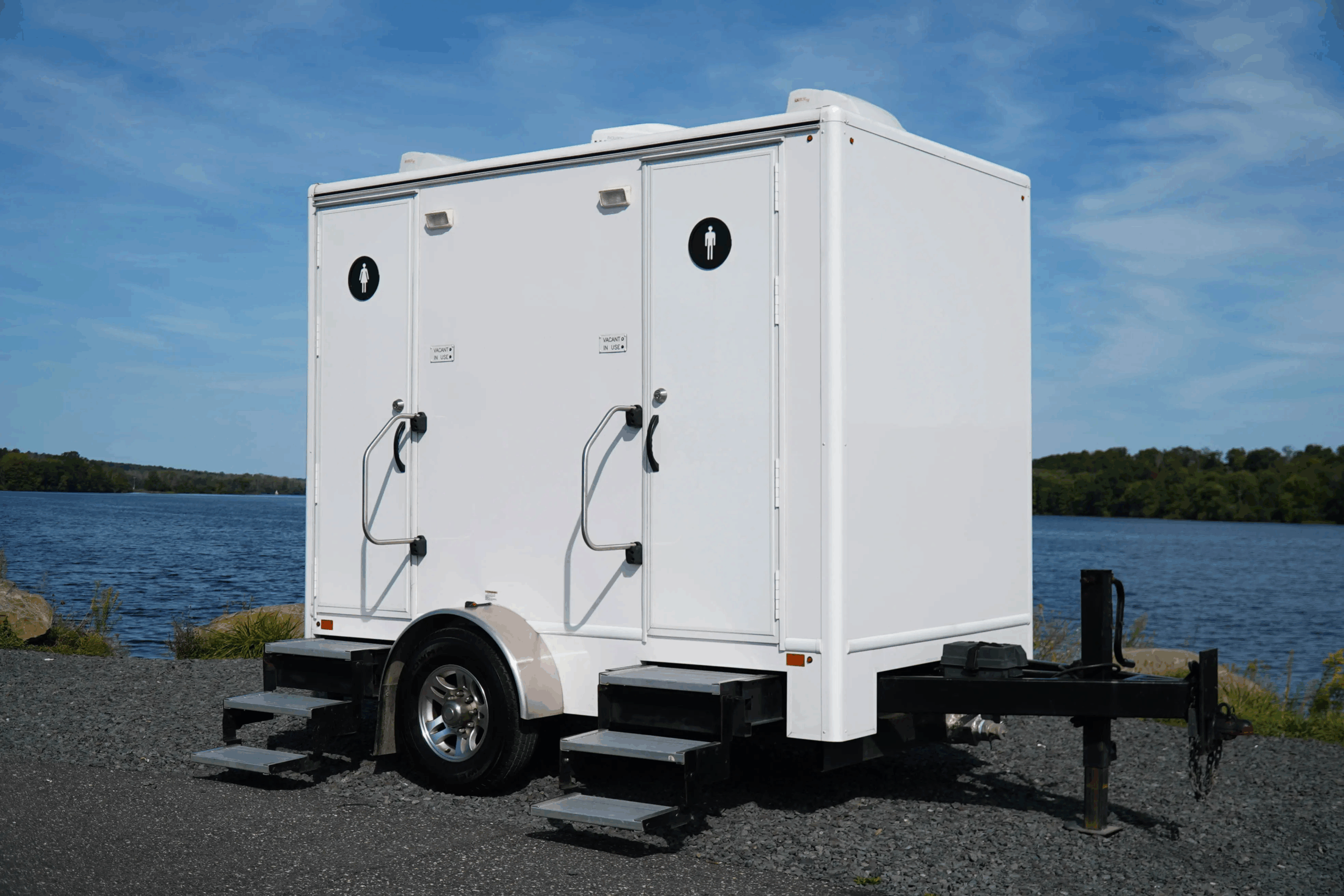
Restroom Trailer Rentals in Simpsonville, South Carolina
Call today for a free quote (864) 477-7907
Restroom Trailer
Fast, Easy, & 100% Free To Get Started
Over 15 Years of Expertise
Our company boasts over 15 years of solid experience providing exceptional restroom trailer services to the Simpsonville community. With strong local ties and an unwavering commitment to quality, we ensure every client enjoys unparalleled satisfaction.
Exceptional Quality Service
Experience excellence with our restroom trailers, designed with premium features to ensure comfort and satisfaction for all guests. Our commitment to quality service makes us a top choice for events in Simpsonville.
Prompt and Reliable Delivery
Enjoy peace of mind with our quick delivery of restroom trailers, tailored to your event or work site needs. We prioritize reliable transport and setup, ensuring your facilities are ready when you need them most.
Sophisticated Restroom Trailer Solutions in Simpsonville
Call for a Free Quote Today
(864) 477-7907
As a trusted, locally-owned company in Simpsonville, we are proud to offer dependable and reliable restroom trailer services. Our expertly maintained units are perfect for a variety of events including construction sites, parties, festivals, and weddings in Simpsonville and surrounding areas. With a commitment to excellence, our skilled team ensures each trailer is clean, comfortable, and ready for use. Combining convenience with style, we cater to events of all sizes, providing solutions tailored to each client's unique needs. Our focus on customer satisfaction and environmental responsibility means you can count on a seamless experience from start to finish. Partner with us for your event sanitation needs and discover the difference that dedication and professionalism bring to restroom trailer rentals.
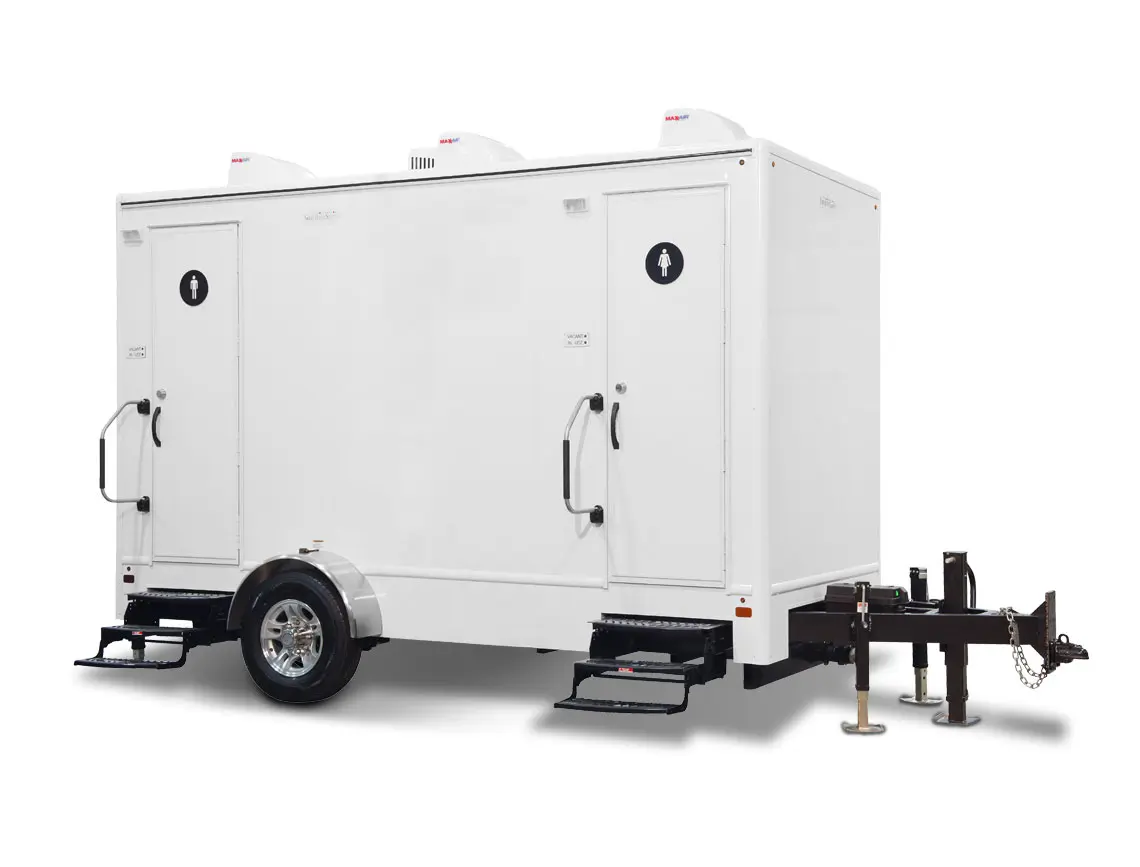
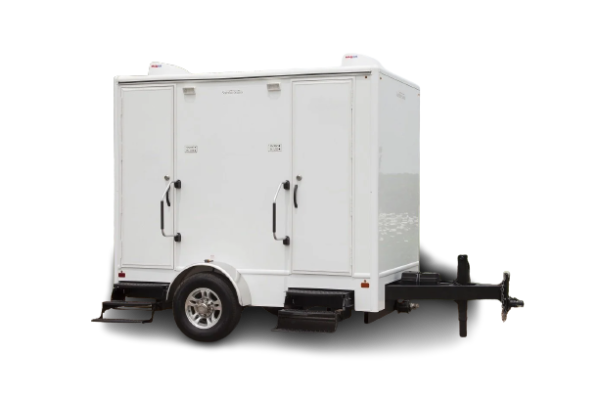
A compact, stylish solution featuring separate entrances for men and women.Each private suite includes flushing toilets, sinks with running water, interior lighting, and climate control for comfort at any event or worksite. (We offer variants 2–10 stalls.)
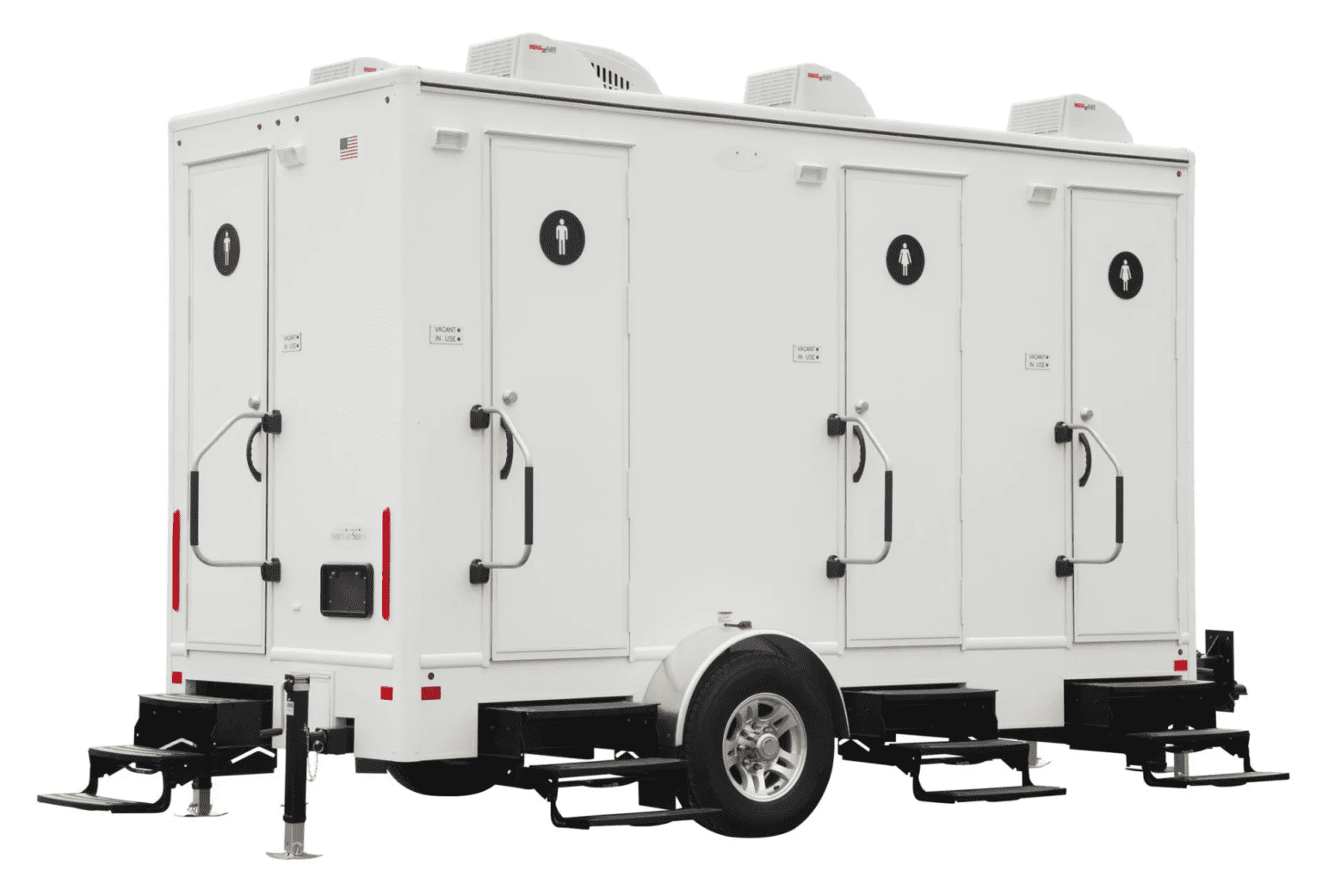
Designed for higher guest capacity, this unit offers four private, individual restrooms with flushing toilets, sinks with running water, interior lighting, and climate control. Ideal for weddings, festivals, and busy job sites.(We offer variants 2–10 stalls.)
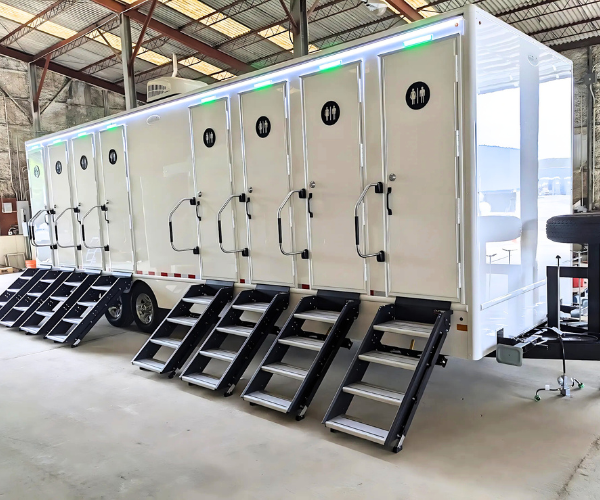
Perfect for large events and high-traffic sites, this spacious trailer provides eight private stalls, each with a flushing toilet, sink with running water, interior lighting, and climate control. A reliable, upscale solution for maximum convenience and comfort.(We offer variants 2–10 stalls.)
We Proudly Serve
Standard Portable Toilets
Our standard portable toilets offer accessible and reliable sanitation solutions for all kinds of events in South Carolina.
High Rise Portable Toilets
High-rise portable toilets guarantee safe and secure sanitation options for downtown Simpsonville and multi-story events.
Restroom Trailers
Our restroom trailers in Simpsonville offer an upscale experience with luxury facilities for any event.
Roll off Dumpsters
Roll off dumpsters from LittleJohn Toilets provide efficient waste management solutions for Simpsonville's commercial or residential projects.
Septic Tank Cleaning
Professional septic tank cleaning services ensure hygienic and efficient waste handling across South Carolina.
Grease Trap Cleaning
Keep your kitchen free of plumbing issues with our reliable grease trap cleaning services in Simpsonville.
Fencing & Barricades
LittleJohn Toilets offers dependable fencing and barricade solutions, securing any event or construction site across South Carolina.
Residential Storage
Our residential storage solutions in Simpsonville provide safe and spacious facilities for your convenience.
Simpsonville Restroom Trailer and Event Rentals
Getting a quote and arranging delivery for our premium Restroom Trailer services is exceptionally easy, tailored for the bustling pace of modern events. Start the process by calling our courteous team, eager to provide a quote that fits your specific needs. Alternatively, fill out our online form with your first name, last name, phone number, and email, ensuring simple and direct access. Upon receiving your details, we quickly assess your requirements, delivering a detailed quote that empowers you to make a confident decision. Our expert team handles the delivery of your restroom trailer with precision and attention, coordinating every step. We offer flexible scheduling to align perfectly with your event timeline, ensuring a smooth setup and integration. Our focus on rapid service includes punctual delivery, accompanied by rigorous checks to confirm that everything is flawless. After the event, we manage collection efficiently, causing minimal disruption while upholding the professionalism and reliability our clients trust. Whether you are hosting a wedding, festival, or corporate event in Simpsonville or nearby, we deliver a hassle-free rental experience from beginning to end. Our dedication to quality and service excellence sets us apart in the industry, offering restroom trailers that enhance your event with elegance and practicality. Count on us to meet your sanitation needs with exceptional professionalism and attention to detail in South Carolina.
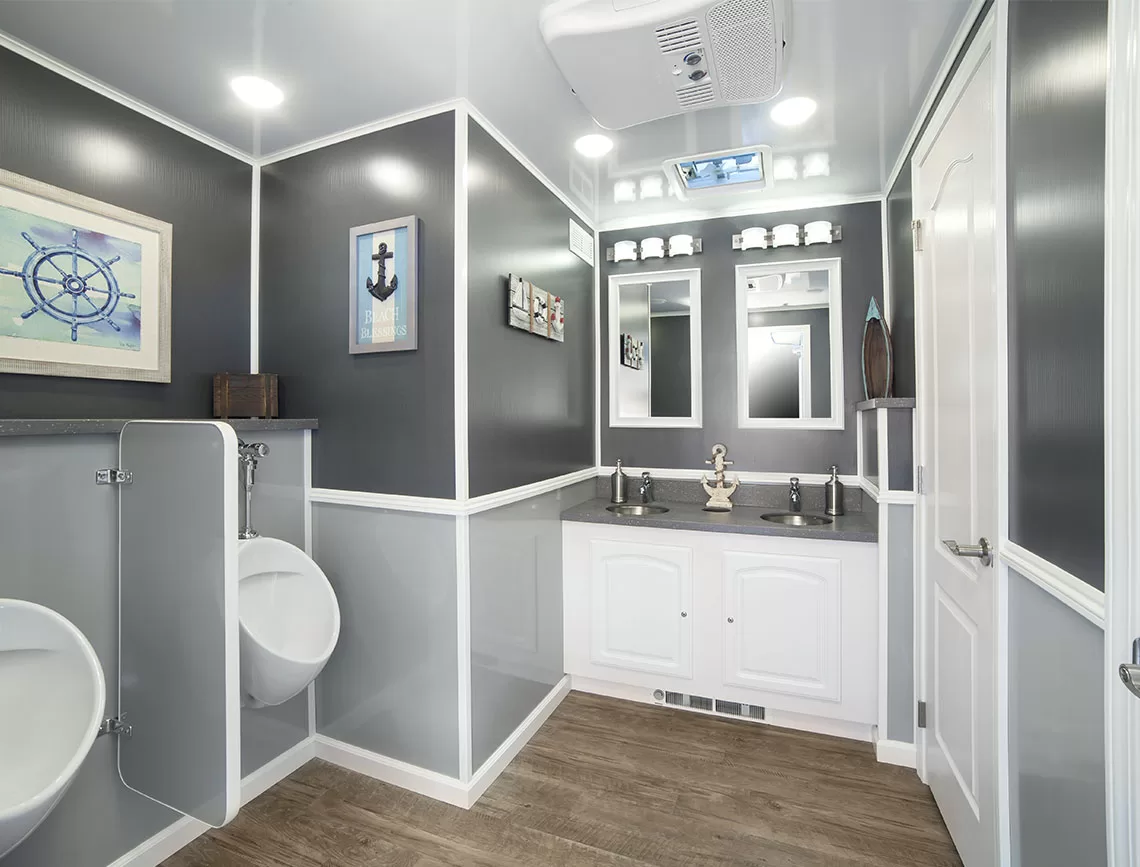
Nestled in Simpsonville, our services capture the charm and excellence that define our community, evident at local events such as the Freedom Weekend Aloft and visits to the historic Heritage Park Amphitheatre. Our restroom trailers embody convenience, offering essential facilities during any town gathering or outdoor event. With the stunning nature surrounding Simpsonville, rich with outdoor attractions, our region thrives as a hub for community events, necessitating facilities that keep pace with this vibrant scene. Our trailers are the ideal solution, ensuring comfort and hygiene for all attendees. Whether it's concerts, sprawling fairs, or intimate family reunions, our restroom trailers promise to deliver exceptional service, enhancing every guest's experience. Clean, reliable, and equipped with modern amenities, they are meticulously designed to meet all your needs. Our commitment to outstanding service has made us Simpsonville's top choice for restroom trailers, thoughtfully supporting every successful event.
Your Top Choice in Simpsonville Our company stands out as the premier choice for restroom trailer rentals in Simpsonville, thanks to our unwavering dedication to quality and customer satisfaction. We have carved a niche in the market with our reliable and innovative solutions, specifically designed to meet the unique needs of our local clientele. Why We Stand Out Our unparalleled focus on providing efficient, hygienic, and safe restroom facilities ensures that we are consistently chosen above competitors. Our trailers are well-suited for a wide array of events, providing comfort and convenience to all our users. With extensive experience and a proven track record, we continue to exceed expectations by offering tailored services that align perfectly with the distinctive characteristics of Simpsonville. Choose us for your next event and experience excellence in portable restrooms.
Fast and Reliable Services for Simpsonville Our quick and dependable restroom trailer services ensure you are never left in the lurch. With a focus on timely delivery and efficient service, we cater to urgent and pre-scheduled needs, perfect for the dynamic demands of Simpsonville events. Streamlined Experiences We pride ourselves on offering fast solutions without compromising on quality. Our team is dedicated to seamless operations, ensuring your restroom facilities are set up promptly for a smooth event experience. Whether it's a last-minute request or a well-planned schedule, we respond with agility and professionalism, keeping customer satisfaction at the forefront of all we do. Our clients can rely on our steadfast commitment to providing essential services punctually and reliably.
Discover Our Restroom Trailers in Simpsonville
Renting a Restroom Trailer in Simpsonville is a straightforward process, designed to be as efficient and customer-friendly as possible. To start, visit our website where several 'Get A Quote' buttons are conveniently placed across the page. By clicking any of these buttons, you will be directed to a simple form, which allows you to enter your first name, last name, phone number, and email. It's a streamlined system aiming to connect you directly with our rental team. Once your form is submitted, our staff promptly reviews your request to provide a personalized quote that reflects your specific event needs. We understand that events vary in scope, which is why our quotation process considers the special requirements and context of your rental. We're committed to transparency, offering detailed information about what you can expect in terms of services, associated costs, and scheduling options. For those who prefer direct contact, phone inquiries are warmly welcomed. A call to our helpful support line will connect you with a representative equipped to assist. They'll gather the details necessary to recommend the best possible trailer option for your occasion. Moreover, our comprehensive selection ranges from basic restroom trailers to luxury units that include additional features like climate control and enhanced privacy. Regardless of your preference, our dedicated team works to redefine customer satisfaction, ensuring each client leaves with a clear understanding of our offerings and how we meet event sanitation needs. By prioritizing user experience and simplicity in our rental process, we ensure that each step is manageable. Whether planning ahead for a grand celebration or needing a last-minute solution, your restroom trailer rental in Simpsonville is made stress-free, allowing you to focus on hosting your successful event.
The typical delivery timeframe for Restroom Trailer orders is designed to prioritize both efficiency and flexibility, ensuring our clients receive their units exactly when needed. Generally, delivery can be expected within a few days of confirmation, depending on the specific requirements and schedule of your event. Our professional team coordinates every aspect of transportation, focusing on a seamless process that eliminates any potential stress related to logistics. Understanding that events can sometimes demand expedited arrangements, we offer options for rapid delivery where necessary. This service is particularly beneficial for last-minute events or unexpected requirements that require immediate solutions. By maintaining a flexible fleet and adaptable scheduling, we meet the varied demands of Simpsonville's dynamic event landscape. Communication is key to our delivery strategy. We inform our clients well in advance of their delivery time, providing real-time updates that ensure peace of mind and allow ample time for planning. One of the principles we uphold is on-time reliability. By ensuring your restroom trailer arrives as agreed, we allow event planners ample preparation time for setup and any essential testing or adjustments. Our experienced staff takes care of the delivery logistics, ensuring your trailer arrives in pristine condition. After your event, the pickup process follows a similarly efficient protocol, prioritizing minimal disruption while swiftly removing the units. This entire delivery framework not only underscores our commitment to customer satisfaction, but it also reflects our understanding of the importance of timely, high-quality service in the successful execution of events.
Absolutely, we take pride in offering comprehensive restroom trailer services tailored to any type of event or construction service. Our diverse range of facilities, including luxury restroom trailers, standard porta potties, roll off dumpsters, fences, barricades, holding tanks, ADA units, portable sinks, and hand sanitizer stations, ensures that we can accommodate a wide variety of needs. We cater to all event types, from large-scale music festivals and bustling sporting events to more intimate gatherings such as weddings and corporate events. Our service model is highly adaptable, capable of managing the varying demands presented by different venues and event sizes. Each of our units is designed with versatile functionality, ensuring efficient operation even in challenging environments. Whether your site is a city park or a construction site, our professional team coordinates everything from delivery to setup—with meticulous attention to detail ensured. In addition to the diversity and quality of our restroom trailer products, we offer customized solutions that resonate with your specific event requirements. This tailored approach guarantees that we not only meet but exceed your expectations at every occasion, reinforcing our position as a leading provider in the market. By remaining flexible and continually investing in the latest equipment and technology, we ensure that each unit represents the highest standards in sanitation and convenience. Trust in our experience and dedication as we work to provide you with services that enhance any event or construction project, prioritizing quality, and efficiency throughout.

